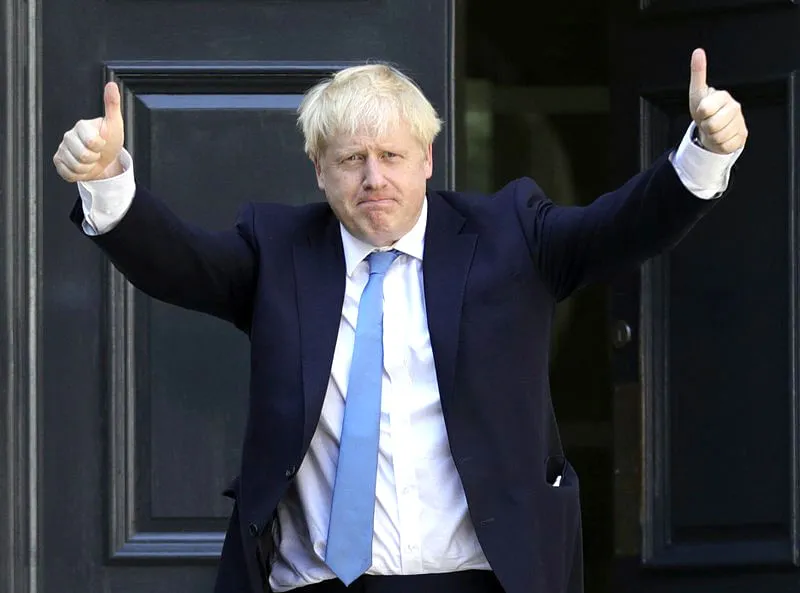Boris Johnson has succeeded Theresa May as Britain’s newPrime Minister. Her failure to get the Brexit deal she had negotiated with theEuropean Union (EU) approved by Parliament proved her undoing. Will Johnson,one of the principal leaders of the Brexit campaign, fare better in getting animproved deal with the EU, one that can win majority support in Parliament?
Johnson is a colourful and charming politician with personaland political contradictions that make it difficult to precisely define him:intellectually able, articulate and yet prone to gaffes and outrageous remarks,filling many people with optimism and yet others with deep suspicion andforeboding, affable and yet ruthless in pursuing his ambition to become PrimeMinister. At 55 he has won control of his Conservative Party amidst acontinuing crisis which has made Britain look as inept as a third worlddictatorship turning into a fledgling and bumbling democracy.
In his first speech as Prime Minister, Johnson tried torally the nation emphasising the “enormous strengths” of its economy “in lifesciences, in tech, in academia, in music, the arts, culture, financialservices”. He asked that it recovers its “natural and historic role as anenterprising, outward-looking and truly global Britain, generous in temper andengaged with the world”. These are fine words but the British people arelooking, at this time, not to engage the world but to the management ofdisengaging with the EU. That is proving very difficult for Britain wants toretain all the advantages which EU membership brings even while giving it up!
Again, Johnson sought to convey the impression, in hisspeech, that his focus as Prime Minister went beyond Brexit. Thus, he referredto improving the health services and education and making the country’s streetssafer. This will really not wash. What brought his predecessor low was Brexitand that is what the people are focussed on. He will be judged by the successwith which he handles it and now the date by which the parting has to takeplace is October 31. He confirmed that he will adhere to that date forBritain’s departure from the EU.
Johnson was combative on Brexit in his remarks. He said thathe would do a “new” and “better” deal but he cautioned the people that Britainhad to prepare for the remote possibility that the EU was unwilling to “negotiate”further. This would be ironic for May has been hounded out precisely becauseParliament consistently turned down the present deal and at the same time didnot want to go in for a no-deal Brexit. The EU leadership has given noindication that it is in any mood to indulge Johnson. The next few weeks willbe contentious and interesting.
Britain’s changing ethnic profile is dramatically reflectedin the composition of the senior ministers in Johnson’s cabinet. Sajid Javid,whose father came to Britain from Pakistan and who was Home Secretary (HomeMinisters in Britain are designated as such) in May’s government is nowChancellor of the Exchequer (Finance Minister). Javid’s rise has been meteoricin British politics. He is an ardent Johnson supporter and is, interestingly,pro-Israel in his leanings. Javid’s successor in the Home office is Priti Patelwhose parents went from Gujarat to Uganda and from there to Britain. She becamean MP in 2010 and has also risen rapidly. It was inconceivable earlier that non-Caucasianscould hold such high political offices in Britain.
Johnson is sometimes compared to US President Donald Trumpwho has hailed him as a “good man” and obviously alluding to Brexit said thathe will get the job done. He also noted that Johnson was being called “BritainTrump”. Clearly, Johnson and Trump are two very different people and it islikely that the British Prime Minister may not be not he enthused at beingcompared to Trump but the fact is that both have a propensity for engaging in,what is now called alternative facts but which in the ‘old days’ was consideredas just lies. In this context it may also be recalled that Trump was sharplycritical of May for not following his advice on Brexit.
John Pienaar, in a recent article, recalled Johnson’s daysas journalist. He wrote that Max Hastings who was, as editor of the DailyTelegraph was Johnson’s boss told him “Boris’s relationship with integrity andtruth and with the right moral standard has always been a bit uncertain to putit politely”. These aspects of Johnson’s personality are widely known for hehas been one on Britain’s foremost public figures over many years. Yet thepublic seem not to care as in the case of Trump too.
Is this a new phenomenon to judge leaders’ charactersdifferently from ordinary persons, the product of our age of frenzied pace andbriefer and briefer attention spans amidst the deluge of news? Or is it thatpeoples have never really looked for virtue in their leaders as long as theyare able to address the needs of the times? The fact is that leaders who arepersonally virtuous and address the needs of the people are venerated but givena choice of personal virtue and political competence it is the latter thatprevails. That has been the case, always.
So, as of now with the EU leaders sticking to the sameconditions they negotiated with May it is difficult to visualise how Johnsonwill do better. But then politics is also about perception and making peoplefeel good. And there he is, by all accounts a master.






